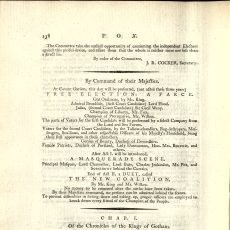Feb
1781
Bristol
Contested
BY ELECTION
Poll book data from:
Citation: The Bristol poll book… (n.p., [1781])
Source: John Sims (ed.), A Handlist of British Parliamentary Poll Books (Leicester, 1984); Jeremy Gibson and Colin Rogers (eds.), Poll Books, 1696–1872: A Directory of Holdings in Great Britain (4th edn., Bury, 2008); L. W. L. Edwards (ed.), Catalogue of Directories and Poll Books in the Possession of the Society of Genealogists (4th edn., 1984).
Timeline & Key Statistics
Contexts & Remarks
Dates: Wednesday 31 Jan.-Saturday 24 Feb. 1781.
Poll book reference: The Bristol poll book... (n.p., [1781]).
The poll book ends with a copy of the petition submitted to the House of Commons by 'divers Persons' against the return of George Daubeny, with the names of subscribers listed.
By-election triggered by the death of Sir Henry Lippincott, who had been elected as MP in 1780.
The Whig-aligned Union Club proposed to the Steadfast Society (Tory) that the Club should fill the empty post this time, and promised to support the Tory candidate should the Tory MP, Matthew Brickdale, die or vacate his seat before the next general election. This proposal was rejected, with the Steadfast Society proposing Henry Cruger as a candidate.
Candidates: George Daubeny (Government Tory) and Henry Cruger (Radical).
George Daubeny, a businessman involved in sugar refining, glass manufacturing and banking, was put forward by the Steadfast Society. He received £5,000 from the Government to defray his election expenses.
Henry Cruger, born in New York, came from a family of American merchants. Through marriage, he was also connected to Samuel Peach, a wealthy linen merchant and leading radical in Bristol. He had been elected as MP for Bristol in 1774, but lost his seat in the 1780 general election. He was reluctantly supported by the Whiggish Union Club.
The Bristol Contest (1781) reported of Cruger's supporters: 'So earnest did they appear in the cause of Mr. Cruger that above a thousand of them subscribed their names to vote for him. They also sent a deputation to the Union Club, requesting them to unite in support of the Whig interest in the person of Mr. Cruger' (p.7). Union Club member Harford, writing to Edmund Burke (former MP for Bristol), supported this: 'Our forces, brave but undisciplined, would have deserted almost to a man if we had refused the combat, and though I am apprehensive we shall be defeated, yet from the spirit our people show I am persuaded we shall gain firmness, and be convinced of the necessity of system and regularity by the event of the contest' (Burke, The Correspondence of Edmund Burke, p.333).
Despite being supported by Burke's friends, Cruger lost the election to George Daubeny. Cruger petitioned, but the result was ultimately upheld.
Poll Book
Below is a digitised version of the poll book for this election:



